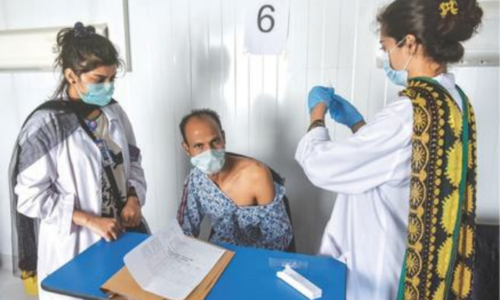Prof Dr Sultan Mustafa is a paediatrician. As a health practitioner for the last more than three decades, people have relied on his findings, acknowledged his diagnoses, praised him for his skills of treatment and taken his words as verdicts on different diseases and complications.
For about a week, however, he’s desperately relying on others for advice. Dr Mustafa last week volunteered for a phase III clinical trial of a potential Covid-19 vaccine at the Aga Khan University Hospital — one of the five sites in the country selected for the multi-country exercise — like hundreds of other countrymen. If proven successful, the trial will help the planet get rid of the coronavirus pandemic. And Pakistan being a part of the trial would bring great advantages to its people.
“I volunteered only to make a contribution,” says Dr Mustafa. “Being a doctor and at the centre of this health crisis, I believe it’s my duty more than anyone else to come forward amid this global challenge. It’s a deliberate attempt to spread awareness among the people that we should volunteer for this major cause.
“There was a little hesitation among the people initially, but the things improved gradually. This planet needs vaccines for this disease and anyone who can play his or her role for this global need should come forward.”
The 56-year-old doctor is one of the 18,000 volunteers who are to be vaccinated at five different health facilities in the country. The exercise is being supported by CanSinoBIO — a Chinese company which has developed a single-dose adenovirus type-5 (Ad5)-vectored Covid-19 vaccine in collaboration with the Beijing Institute of Biotechnology.
“The CanSinoBIO’s is a single-dose vaccine that uses a weakened human common cold virus (adenovirus Ad5), incapable of replicating itself, to carry coronavirus proteins into cells in the body. This causes the body to mount an immune defence against the virus,” says Dr Naila Baig-Ansari, the head of research at the Indus Hospital — another health facility in the city where the trial is going on.
“The response from the people is good so far. We faced a few issues initially as people who volunteered didn’t show much responsibility and avoided sharing follow-up details, but things are fine now.
“There are a few conditions to becoming a volunteer. For instance, the participant has to be above 18 years of age, should never have lab-proven Covid-19, should not be pregnant, nor lactating, or plan to become pregnant within 90 days after receiving the vaccine. Only healthy or stable-healthy adults with controlled pre-existing medical conditions are eligible to participate.”
The Pakistani health authorities agreed in August to hold a clinical trial of the Chinese vaccine. This trial is one of eleven trials being carried out across the world and the vaccine has been tested successfully on a few hundred people (phases I and II).
The Indus Hospital says that as part of its development process, the vaccine now needs to be tested on thousands of people before it can be made available for everyone. Nearly 50,000 volunteers will participate in this randomised placebo-controlled trial in Argentina, Chile, Mexico, Saudi Arabia, Russia and Pakistan.
“Being a haemophobic [suffering from fear of blood] and trypanophobic [fear of medical procedures involving injections or needles], I was a little concerned about my blood being drawn,” says another volunteer, Syeda Mehwish, who joined the trial at the Indus Hospital. “But once I made up my mind about joining forces with those who had volunteered for the initiative, I did not look back. The entire process has been seamless. After getting the vaccine, I had fever and body aches for the next 24 hours as expected… I suggest to all those who fulfill the criteria, to get themselves and their families vaccinated.”
To ensure a comprehensive and credible study, the health authorities recently increased the number of volunteers from 10,000 to 18,000 with the deadline to complete the trial in the current month so that the process of registration of the vaccine could be started.
Even if the trial proves successful and despite the valiant contribution of volunteers like Dr Sultan and Ms Mehwish, however, the miseries attached to the pandemic will not disappear overnight. “If all goes well and everything delivers the required results, I think for the general public this vaccine will not be available before May or June. That’s because we think frontline healthcare workers should be vaccinated first and then members of public, according to their health conditions and ages,” says Dr Baig-Ansari.
Published in Dawn, December 20th, 2020














































